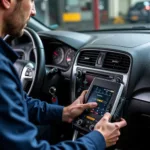Understanding the cost for a car diagnostic machine is crucial for both professional mechanics and DIY enthusiasts. Whether you’re a seasoned technician or a car owner looking to save on repair bills, choosing the right diagnostic tool requires careful consideration of features, functionality, and of course, price. Let’s delve into the factors influencing the cost of these essential tools. You might also want to check out a diagnostic scan tool for Australian cars.
Factors Affecting Car Diagnostic Machine Costs
Several key factors contribute to the overall cost for car diagnostic machine. Understanding these elements will help you make an informed decision.
Software Capabilities
The software included with a diagnostic machine plays a significant role in its price. Basic code readers are relatively inexpensive, offering limited functionality like reading and clearing diagnostic trouble codes (DTCs). More advanced systems provide access to live data streams, bi-directional controls, and specialized functions like key programming and module coding, which naturally come at a higher cost.
Vehicle Coverage
Diagnostic machines vary in their vehicle coverage. Some are designed for specific makes and models, while others offer broader compatibility across various manufacturers. Universal scanners, capable of diagnosing a wide range of vehicles, tend to be more expensive than manufacturer-specific tools.
Hardware Durability
The durability and build quality of the hardware also impact the price. Professional-grade diagnostic machines are built to withstand the rigors of daily use in a workshop environment. They often feature rugged housings, reinforced cables, and high-quality connectors, contributing to a higher price tag compared to consumer-grade options.
Additional Features and Updates
Features like built-in Wi-Fi, Bluetooth connectivity, touchscreen interfaces, and regular software updates can influence the overall cost. While these features enhance usability and provide access to the latest diagnostic information, they often come at a premium. Check out options for a multi car diagnostic machine bluetooth.
Types of Car Diagnostic Machines and Their Costs
Car diagnostic machines can be broadly categorized into several types, each with its own price range.
Basic Code Readers
These entry-level tools are the most affordable, typically costing between $20 and $100. They are primarily designed to read and clear DTCs, providing a basic understanding of the issue.
OBD-II Scanners
OBD-II scanners offer more functionality than basic code readers, displaying live data streams, freeze frame data, and other valuable information. Their price range varies from $50 to $500, depending on the features and capabilities.
Professional Scan Tools
These high-end diagnostic machines are designed for professional mechanics and offer comprehensive diagnostic capabilities, including bi-directional controls, module coding, and advanced functionalities. Their price can range from several hundred to thousands of dollars.
Choosing the Right Diagnostic Machine
Selecting the right diagnostic machine depends on your individual needs and budget. For DIY enthusiasts, a basic code reader or an OBD-II scanner might suffice. Professional mechanics, however, require the advanced capabilities offered by professional scan tools. Consider your specific requirements, vehicle coverage needs, and budget to make the best choice. If you’re looking to purchase a diagnostic machine, explore options for a car diagnostic machine for sale in mpumalanga.
What are the Long-Term Costs of Owning a Diagnostic Machine?
Beyond the initial purchase price, consider ongoing costs like software updates, subscription fees, and potential repair or replacement costs.
“Investing in a quality diagnostic tool, even at a higher initial cost, can save you money in the long run by enabling accurate diagnoses and preventing unnecessary repairs,” says Alex Walker, Senior Automotive Diagnostic Technician at Precision Auto Diagnostics.
Conclusion
The cost for a car diagnostic machine varies significantly based on several factors, including software capabilities, vehicle coverage, hardware durability, and additional features. By carefully evaluating your needs and understanding the different types of diagnostic tools available, you can make an informed decision and invest in the right machine for your requirements. Remember, investing in a reliable diagnostic machine can save you money and time in the long run by enabling accurate diagnoses and preventing costly repairs. You can also find specific tools like a diagnostic car tool bmw. Don’t hesitate to explore options for car diagnostic near me.
FAQ
- What is the cheapest type of car diagnostic machine? Basic code readers are the most affordable.
- Do I need a professional scan tool if I’m a DIYer? Not necessarily, an OBD-II scanner might be sufficient.
- What are the benefits of a professional-grade diagnostic machine? Advanced features, bi-directional controls, and comprehensive vehicle coverage.
- How often do diagnostic machines require software updates? This varies depending on the manufacturer and the specific model.
- Where can I buy a car diagnostic machine? Online retailers, automotive parts stores, and specialized tool suppliers.
- Can I use a diagnostic machine on any car? Compatibility varies, ensure the machine supports the make and model of your car.
- Are there long-term costs associated with owning a diagnostic machine? Yes, potential costs include software updates, subscription fees, and repairs.
Common Diagnostic Scenarios
A check engine light can indicate various issues, from a loose gas cap to a more serious engine problem. A diagnostic machine helps pinpoint the exact cause. Similarly, diagnosing transmission issues, ABS problems, or airbag faults requires a diagnostic tool.
Further Reading and Resources
Explore articles on specific diagnostic tools and troubleshooting guides for common car problems.
Need assistance? Contact us via WhatsApp: +1(641)206-8880, or Email: [email protected]. Our customer service team is available 24/7.



